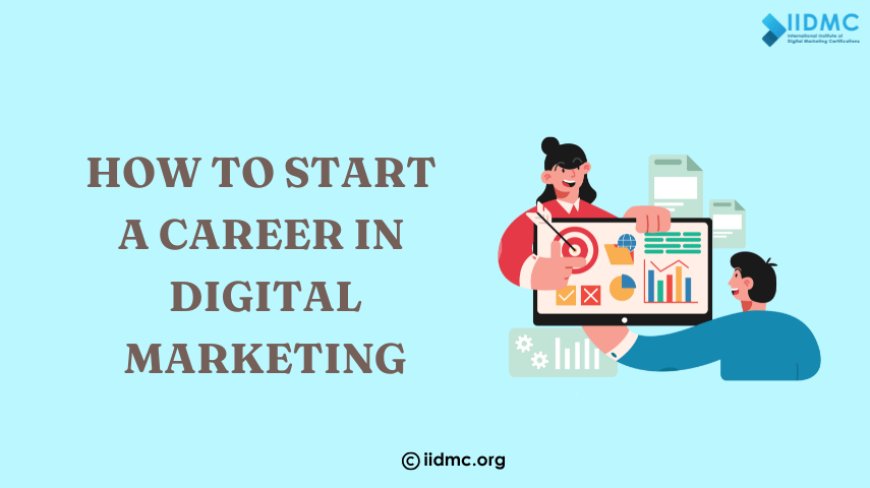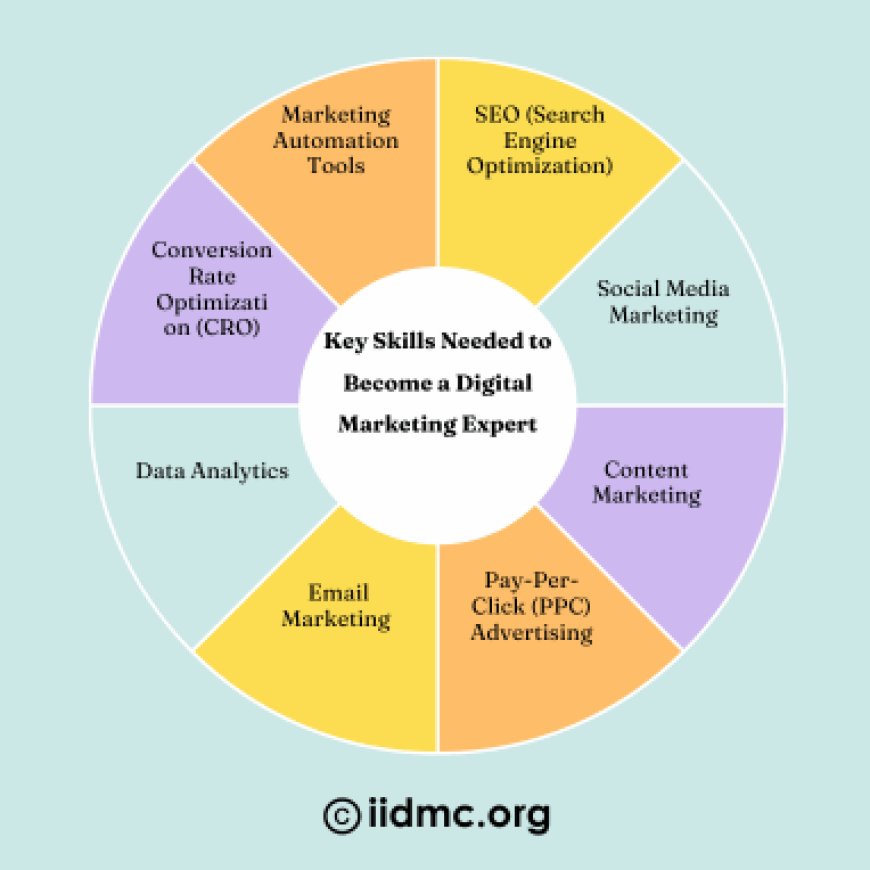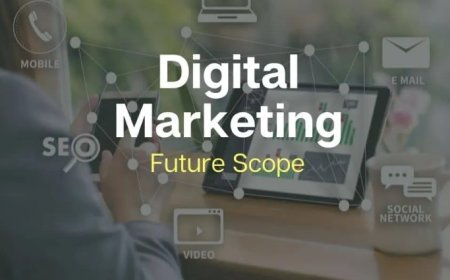How to Get Started in Digital Marketing
Learn how to get started in digital marketing with this beginner's guide! Explore essential skills, key strategies, and actionable steps to launch your career in digital marketing and stay ahead in today’s competitive online landscape.

How to Get Started in Digital Marketing
Digital marketing can feel a bit like learning a new language there's a lot to explore, but it’s simpler than it seems once you get the basics down. Whether you're interested in social media, search engines, or content creation, digital marketing offers countless paths to get creative and connect with people online. The great thing is, you don’t need to be a tech wizard to get started. With just a computer and an internet connection, you can dive into the strategies that help brands reach people, build trust, and grow. This guide will walk you through the key steps and tools to kickstart your journey, from understanding the basics to getting hands-on experience.
Understanding the Core Components of Digital Marketing
-
SEO (Search Engine Optimization): Helps websites rank on search engines by using keywords and quality content so people can easily find them.
-
Content Marketing: Involves creating valuable content—like blogs or videos—that engage audiences and build trust without directly selling.
-
Social Media Marketing: Uses platforms like Instagram and Facebook to share content, run ads, and connect with audiences in a more personal way.
-
Email Marketing: Builds relationships by sending tailored messages, such as newsletters or special offers, directly to people’s inboxes.
-
PPC (Pay-Per-Click Advertising): Paid ads appear on search engines or social media, and businesses pay when people click, quickly driving traffic.
-
Analytics and Data: Tracks performance, helping marketers understand what works and make data-based improvements.
These basics give you a solid start in digital marketing, from driving traffic to building connections with audiences.
Key Skills Needed to Excel in Digital Marketing

-
Analytical Skills and Data Interpretation:
Digital marketing is data-driven, so being able to analyze numbers and spot trends helps you make better decisions. Whether it’s tracking website visits or understanding ad performance, knowing how to read data can guide your strategies. -
Creative Writing and Content Creation:
Content is what attracts people, so strong writing skills are essential. Being able to create clear, engaging, and relevant content—whether it’s for blogs, social media, or emails—can make a big difference in connecting with audiences. -
Understanding Consumer Behavior and Digital Trends:
Knowing what motivates people and keeping up with current trends online allows you to tailor your marketing efforts effectively. This helps you create campaigns that feel relevant and are more likely to get attention. -
Basic Design Knowledge for Creating Visuals:
Visuals are a huge part of digital marketing, so understanding basics like color, layout, and image editing can help you create eye-catching graphics. You don’t need to be a pro, but some design skills go a long way. -
Proficiency in Tools like Google Analytics, SEO Tools, and Social Media Platforms:
Familiarity with tools that track performance, improve search engine ranking, and manage social media is essential. Platforms like Google Analytics, SEO software, and social media scheduling tools are widely used to streamline tasks and measure success.
Developing these skills gives you a solid foundation to succeed in digital marketing, making it easier to plan, create, and measure effective campaigns.
Steps to Get Started in Digital Marketing
-
Learn the Basics
Start with online courses that introduce you to digital marketing. Platforms like Google Digital Garage, Coursera, and Udemy offer both free and paid courses that cover everything from SEO to social media. -
Build Foundational Skills
Focus on developing key skills like SEO, content creation, and social media management. These skills are essential and will give you a solid base to grow in digital marketing. -
Set Up Personal Projects
Practice is key! Start your own blog, create a social media profile, or try a small ad campaign. These projects help you learn hands-on, giving you real experience to apply what you’ve studied. -
Utilize Free Tools and Resources
Many free tools can make your work easier, like Google Analytics for tracking website performance and Canva for creating visuals. These are great for beginners and help you learn as you go. -
Stay Updated
The digital world changes often, so it’s helpful to keep learning. Follow industry blogs, connect with influencers, and join online communities to stay in the loop and keep building your knowledge.
Starting with these steps will help you gain both the knowledge and practical experience to begin your journey in digital marketing.
Gaining Experience in Digital Marketing
-
Start with Freelance Projects or Internships
Look for beginner-friendly projects on platforms like Upwork, Fiverr, or LinkedIn. Many companies seek freelancers or interns for smaller tasks, which are perfect for learning the ropes and building practical skills. -
Volunteer for Non-Profits
Non-profits often need help with digital marketing but have limited budgets. Volunteering for these organizations gives you real-world experience, helps you build a portfolio, and lets you make a positive impact. -
Networking and Mentorship
Join digital marketing groups on LinkedIn, Facebook, or Reddit to connect with others in the field. You can learn a lot from experienced marketers and even find a mentor who can guide you as you grow.
Building a Portfolio and Resume
-
Showcase Your Skills and Projects
Use your resume and portfolio to highlight specific skills, such as SEO, social media, or content creation. Include examples of projects, even personal ones, to show potential employers your abilities. -
Highlight Key Metrics
Whenever possible, include metrics like engagement rates, website traffic increases, or improved conversion rates. Showing concrete results adds credibility to your work and demonstrates the impact of your efforts.
These steps will help you gain experience, build connections, and create a portfolio that shows what you can do in digital marketing.
Exploring Career Paths in Digital Marketing
-
Overview of Various Roles
Digital marketing offers several specializations: -
SEO Specialist: Focuses on improving website visibility in search engines.
-
Content Marketer: Creates valuable content to attract and retain an audience.
-
Social Media Manager: Manages social platforms to boost engagement and brand presence.
-
PPC Specialist: Runs paid ad campaigns to drive targeted traffic.
-
Digital Marketing Strategist: Develops overall marketing strategies across channels.
-
Career Progression and Choosing a Specialization
Many start in general roles, gaining broad skills before narrowing down. Explore different areas to see what excites you, and choose a focus based on both interest and demand. Most digital marketers grow into specialist or strategist roles over time.
Common Mistakes to Avoid as a Beginner
-
Overlooking Analytics and Data
Data tells you what’s working and what isn’t. Ignoring it can lead to missed insights and opportunities for improvement. -
Focusing on Quantity Over Quality
Publishing lots of content is less effective than creating quality pieces that truly engage and provide value to your audience. -
Ignoring Testing and Iterating Campaigns
Digital marketing is all about refining strategies. Testing different approaches and tweaking your campaigns based on feedback and performance is key to success.
Resources to Continue Learning and Growing
-
Blogs, YouTube Channels, and Podcasts
Resources like Moz Blog, Neil Patel’s YouTube channel, and the “Marketing School” podcast offer valuable insights for ongoing learning. -
Certifications
Certifications such as Content Marketing, and Facebook Blueprint help build credibility and expand your skillset, making you more competitive in the field.
By exploring these paths, avoiding common pitfalls, and leveraging learning resources, you’ll be well-prepared to build a successful career in digital marketing.
Starting a career in digital marketing might seem overwhelming, but breaking it down into clear steps can make it manageable. Begin by learning the basics through platforms like IIDMC. Focus on building foundational skills, such as SEO, content creation, and social media management. Gain experience with small projects, freelance work, or internships, and use each opportunity to refine your skills.
Remember, digital marketing is a constantly evolving field. Stay connected with industry trends, and don’t hesitate to experiment with new strategies. By taking that first step and committing to continuous learning, you’ll set yourself up for a rewarding and successful journey in digital marketing.




























